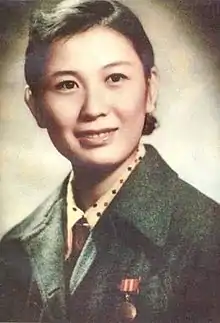Yan Fengying
Yan Fengying (13 April 1930 – 8 April 1968), born Yan Hongliu, also known as Yan Daifeng,[1] was a Chinese Huangmei opera artist who played dan (female) roles. Though she lived a short life, she left such a mark and is today remembered as the "queen of Huangmei opera".[2]
Yan Fengying | |||||||
|---|---|---|---|---|---|---|---|
 | |||||||
| Born | April 13, 1930 | ||||||
| Died | April 8, 1968 (aged 37) Hefei, Anhui, People's Republic of China | ||||||
| Occupation | Huangmei opera performer | ||||||
| Years active | 1944–1966 | ||||||
| Known for | Young dan roles | ||||||
| Style | Yan school (founder) | ||||||
| Spouses | Gan Lüzhi (甘律之)
(m. 1954–1956)Wang Guanya (王冠亚)
(m. 1956–1968) | ||||||
| Children | 2 | ||||||
| Chinese name | |||||||
| Traditional Chinese | 嚴鳳英 | ||||||
| Simplified Chinese | 严凤英 | ||||||
| |||||||
Like most famous Chinese opera artists, Yan Fengying suffered greatly in the Cultural Revolution (1966–1976). Charged with 13 (trumped up) criminal counts of "counterrevolutionary activities" and tortured beyond enduring, she killed herself in 1968. Her death reveals the shocking cruelty and lunacy of that period. After her overdosing on sleeping pills was discovered by her husband Wang Guanya, instead of rushing her to the hospital, the authorities held a struggle session at her bedside.[3] One hospital refused to admit her, and the one that did, reluctantly, refused to treat her without permission from her danwei (work unit). She died without receiving treatment, but was promptly dissected to find out whether she carried an enemy (Kuomintang) radio transmitter in her body.[4] Writer Geling Yan, who grew up in Hefei, described what she saw on that day in a 2012 interview:[5]
I always remember Yan Fengying's suicide. At that time she was unconscious, tubes all over her body. IV lines, urine catheters. The male doctor just had her exposed like that for everyone to see. She had no clothes on, nude, flesh waiting to be cut up, in full view of a group who could hurt her. She was a specimen stapled on a hospital bed. An electrician intentionally dropped [his] cigarette butt [on her]... At that time I was 9. I was terrified.
Wang Guanya published a biography of her in 1981, and wrote the screenplay of the TV series Yan Fengying. The 1988 biopic, which starred "the next Yan Fengying" Ma Lan in the title role, became a national hit (and made Ma Lan well known among those who do not listen to opera). One man was so moved by Yan's tragic fate that he sold all his clothes to travel from Fujian to Hefei to "beat up" Wang Guanya because he thought Wang did not protect his wife enough. More people, however, sympathized with Wang, who was himself tortured, and many girls offered to marry him. Until his death in 2013, Wang Guanya never remarried. He spent the rest of his life adapting Yan Fengying's repertoire into TV series, radio series, and Huangmei operas for the younger generation.
Repertoire (incomplete)
| English Title | Original Title | Role | Notes |
|---|---|---|---|
| Tian Xian Pei | 天仙配 | Seventh Fairy | made into a 1956 film |
| The Female Imperial Son-in-Law | 女駙馬 | Feng Suzhen | made into a 1959 film |
| Liu Sanjie | 劉三姐 | Liu Sanjie | |
| The Cowherd and the Weaver Girl | 牛郎織女 | Weaver Girl | made into a 1963 film |
| The Couple Enjoys the Lantern Show | 夫妻觀燈 | Wang Xiaoliu's wife | a video from 1956 survives |
| The Green Jade Hairpin | 碧玉簪 | Li Xiuying | Audio recording survives |
| Hitting the Princess | 打金枝 | Princess Shengping | |
| Cutting Hogweed | 打豬草 | Tao Jinhua | |
| An Appointment on Blue Bridge | 藍橋會 | Lan Yulian | |
| Delivering the Fragrant Tea | 送香茶 | Chen Yueying | |
| A Kitchen Knife Story | 菜刀記 | Liu Fengying |
References
- Chan, Shirley Wai (2003). "Yan Fengying". In Lee, Lily Xiao Hong (ed.). Biographical Dictionary of Chinese Women: The Twentieth Century (1912–2000). Translated by Michael Paton. Routledge. pp. 609–10. ISBN 0-7656-0043-9.
- "The queen of Huangmei Opera remembered". China Daily. 2010-06-18.
- Guo Jian; Song, Yongyi; Zhou, Yuan (2009). The A to Z of the Chinese Cultural Revolution. Scarecrow Press. p. 333. ISBN 978-0-8108-6870-0.
- Yan Jiaqi; Gao Gao (1996). Turbulent Decade: A History of the Cultural Revolution. Translated by D.W.Y. Kwok. University of Hawaiʻi Press. p. 261. ISBN 0-8248-1695-1.
- Cao Xueping (2012-09-28). "严歌苓:小说源于我创伤性的记忆" [Geling Yan: My Fictions Stem from Traumatic Memories]. Beijing News (in Chinese).